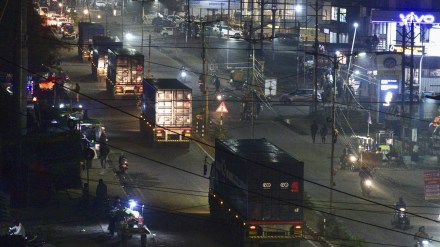Forty years after the Bhopal gas tragedy, authorities have removed 377 tons of hazardous waste from the defunct Union Carbide factory for disposal in Dhar district. The toxic waste was transported on the night of January 1 in 12 sealed container trucks, travelling along a “green corridor” from Bhopal to Pithampur, about 250 kilometres away.
The relocation comes amid protests in Pithampur, where local residents have voiced opposition to the disposal of the waste in the area, which has a population of approximately 1.75 lakh. On Sunday, a large protest march took place against the plan.
The trucks arrived at the disposal facility in Pithampur around 4.30 AM on Thursday, following a seven-hour journey under tight security. The waste is now parked on the facility’s campus, where it will be processed for incineration.
Bhopal Gas Tragedy Relief and Rehabilitation Department Director Swatantra Kumar Singh said that nearly 100 workers have been involved in loading and packing the waste into the trucks since Sunday. Workers were required to take regular health check-ups and rest every 30 minutes during the process.
The waste being disposed of originated from the Union Carbide plant, where a catastrophic gas leak occurred on the night of December 2-3, 1984. The release of methyl isocyanate (MIC) gas killed at least 5,479 people and caused long-term health issues for thousands more.
The Madhya Pradesh High Court, which recently rebuked authorities for failing to address the waste issue despite multiple Supreme Court orders, set a four-week deadline for the removal. The court warned of contempt proceedings if its directive was not followed.
The waste will be incinerated at the Pithampur facility, with the process expected to take up to three months if no harmful residues remain. If traces of toxins are found, the process could take up to nine months. The incinerator will utilise a four-layer filter system to prevent air pollution, and any remaining ash will be buried under a two-layer membrane to prevent contamination of soil and water, Singh said.
Experts from the Central Pollution Control Board (CPCB) and State Pollution Control Board (SPCB) will oversee the disposal process to ensure it is conducted safely and in compliance with environmental regulations.
Concerns have been raised by local activists, who allege that a 2015 trial incineration of 10 tons of waste in Pithampur led to soil and water contamination in surrounding areas. However, Singh dismissed these claims, stating that the decision to use the Pithampur facility was made after thorough review of the 2015 test results and all objections.
(With PTI inputs)
